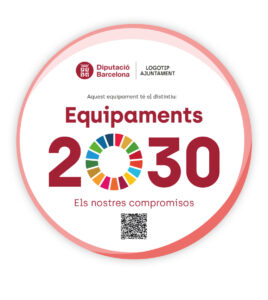Sustainable, egalitarian and participatory spaces is the commitment of the Diputació de Barcelona and the city councils to adapt municipal facilities with a projection to 2030.
They will be municipal spaces of the future with the capacity to respond to global challenges such as intolerance, climate change or social inequality.
In this way, the Diputació de Barcelona will begin to lead the transformation of municipal spaces and facilities into educational and responsible facilities aimed at playing a more active role in society.
The objective is to go beyond the limits of a building to achieve integration with the environment, the people living in the surrounding area and the entire community.
Agenda 2030 for future municipal facilities
The 2030 Agenda is the guiding horizon for advancing the adaptations and promoting this new type of equipment. Nowadays, municipalities are facing global challenges that they must face in the best way possible. These challenges drive the creation of accessible, participatory, egalitarian, sustainable and integrative spaces.
The investment
In order to meet these objectives, the “Equipments 2030” project was consolidated, with the participation of 268 municipalities and an estimated investment of 8,700,000 euros.
The goal is to transform and give new meaning to the 6,118 municipal facilities and spaces for sports, education and youth that exist in the province of Barcelona.
The spaces will become the epicenter of transformation and the experience of values such as diversity, inclusion, non-discrimination, gender equity, democratic participation, equal rights and active citizenship.
Municipal facilities as meeting points
Likewise, it is intended that municipal public facilities become meeting points for social relations and coexistence from where an active citizenship can be built.
They will guarantee equal and universal access to all citizens, without discrimination of any kind or economic barriers, color, nationality, age, language, religion, disability or sexual orientation.
They will be open spaces free of machismo, violence, discrimination or abuse. They will be points of encounter and coexistence between cultures and generations.
Finally, resources will be invested to transform municipal buildings and facilities into environmentally responsible sustainable spaces and facilities, committed to the fight against climate change, improving energy efficiency and the circular economy.
For its part, the “Equipments 2030” project was well integrated with the same working objectives of the Sustainable Development Goals, SDGs.
They promote the transformation of public facilities and spaces into sustainable, state-of-the-art facilities.
They will also seek to educate on wellness, health, gender equality, clean energy, innovation, reducing the inequality gap and building sustainable communities and cities.

